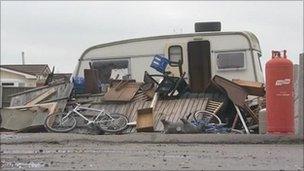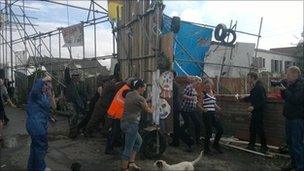Dale farm eviction: Media attention 'significant' for travellers
- Published

Some barricades still remain at Dale Farm ahead of the High Court decision
Not far from the main gateway there is a quiet corner of Dale Farm which, until a few days ago, was empty of all life except for a patch of weed that was steadily expanding its dominion over the surrounding gravel.
Some old plastic pipes lay scattered around. An old sofa sat next to the wall backing onto the neighbouring property.
This little yard belonged to one of the Dale Farm residents who had offered it as a temporary home to the journalists who have flocked here in recent weeks. Several bales of straw were provided to soften the ground.
I have slept in many unusual spots in my reporting life.
They range from the bleakness of abandoned houses surrounded by the dead in Rwanda; the surrealism of a police station in Tikrit, Iraq where we were kept awake all night by mewling kittens, and the sublime beauty of Neimoa, a tiny island of the Calvados chain in Papua New Guinea where we were woken in the dawn by the sound of children splashing in the clear warm water.
The media camp at Dale Farm belongs in an entirely separate and, as yet, undefined category.
By night it is cold and the autumn dewfall lies in a glistening film across the tents.
The snoring of assorted journalists drifts across the yard, accompanied by the muttered curses of those they are keeping awake. Dogs erupt in frantic barking and just as suddenly go silent again.
'Significant moment'
Since the end of August when an eviction began to loom there has been a steady ebb and flow of journalists into the camp seeking the opinions of residents and the hundred or so activists who have joined them.
Only in the last week however has the media "embedded" itself at Dale Farm.
On Monday when eviction seemed imminent, the media presence swelled so that it felt at one point as if we might outnumber the residents themselves.
Evictions have long been a feature of traveller life but none has ever attracted this scale of media attention.
This has partly to do with the size of Dale Farm - about 400 people are potentially affected, making it the biggest such camp in Europe.

A main gate to keep out bailiffs at the UK's largest illegal traveller site has been opened in line with a court order
But it also marks a significant moment in the history of traveller and Gypsy campaigning.
The families at Dale Farm would once have avoided the scrutiny of the outside world.
But over the last decade they have learned the importance of communicating their message. They have become accustomed to the presence of reporters and to having their story told.
They may loath some of what is reported: the stories about big houses back in Ireland, for example, or the accusations of intimidation levelled by at least one neighbour here.
Media welcome
There are flashes of anger from residents and activists: the presence of hydraulic camera platforms overlooking the camp sparked a dispute, and representatives of some newspapers are decidedly unwelcome.
But broadly speaking the media is welcomed at Dale Farm.
The travellers realise they are fighting a battle for public opinion and have willingly accepted help from outside groups.
Activists who have honed their skills working for small NGOs on issues like climate change have taken over the job of organising interviews with representatives of the travellers.
The atmosphere is febrile. Rumours fly around all day. A man arrives to say that access roads have been blocked to stop activists converging.
Every conversation here hinges on what might happen in the court. "Will the judge let us stay?" a woman asks me.
I tell her I have no idea.
There is a constant watch on the compound where the bailiffs gathered last Monday, only to be told the eviction had been postponed following the court action.
In the last few hours the BBC team has managed to graduate from our tents to a caravan, courtesy of a colleague from BBC documentaries who has been filming in the community for several years.
No more dewfall for us. How long will we remain here?
That is up to the courts.
- Published23 September 2011
- Published21 September 2011
- Published20 September 2011
- Published19 September 2011